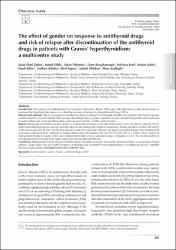The effect of gender on response to antithyroid drugs and risk of relapse after discontinuation of the antithyroid drugs in patients with Graves' hyperthyroidism: a multicentre study

View/
Date
2020Author
Zuhur, Sayid ShafiYıldız, İsmail
Altuntaş, Yüksel
Bayraktaroğlu, Taner
Erol, Selvinaz
Şahin, Serdar
Kadıoğlu, Pınar
Akbaba, Gülhan
Metadata
Show full item recordAbstract
Introduction: The outcome of medical treatment in patients with Graves' disease (GD) is generally difficult to predict. In this study, we examined the hypothesis that gender may affect the outcome of treatment with antithyroid drugs (ATDs). Material and methods: This is a retrospective multicentre study including 717 (514 female and 203 male) patients with the first episode of GD treated for at least 12 months. Patients were classified as relapse, poorly controlled (several episodes of hyperthyroidism followed by euthyroidism and rarely hypothyroidism, occurring after titration of ATDs), and remission. Results: During the mean follow-up time of 26.75 +/- 21.25 months (between 1 and 120 months), 269 (37.5%),176 (24.5%), and 272 (37.9%) patients experienced a relapse, a poorly controlled disease, and remained in remission, respectively. During the follow-up time, 223 (43.4%) of the female and only 49 (24%) of the male patients remained in remission. Relapse and poorly controlled disease (non-remitting GD) were more common in male compared to female patients with GD (hazard ratio 1.26, 95% CI: 1.03-133, p - 0.025). Graves' disease in male patients tended to relapse earlier, and male patients tended to have larger goiter sizes at diagnosis as well. The smoking habit was also significantly inure frequent in males compared to female patients with GD. Conclusion: Male patients with GD have a markedly higher frequency of relapse and poorly controlled disease, as compared to female patients. Larger goiter sizes and higher frequency of smoking may contribute to the higher frequency of relapse and poorly controlled disease in male patients.

















